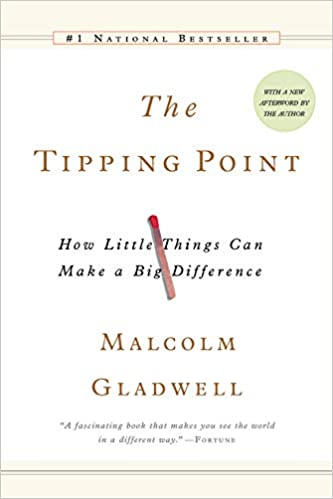Why is it that some ideas or behaviors or products start epidemics and others don't? And what can we do to deliberately start and control positive epidemics of our own?
Epidemics are a function of the people who transmit infectious agents, the infectious agent itself, and the environment in which the infectious agent is operating. And when an epidemic tips, when it is jolted out of equilibrium, it tips because something has happened, some change has occurred in one (or two or three) of those areas
The hard part of communication is often figuring out how to make sure a message doesn't go in one ear and out the other. Stickiness means that a message makes an impact
There are relatively simple changes in the presentation and structuring of information that can make a big difference in how much of an impact it makes
It is almost a matter of psychological survival, if one is surrounded and pressed by millions of people, to prevent them from constantly impinging on you, and the only way to do this is to ignore them as often as possible. Indifference to one's neighbor and his troubles is a conditioned reflex in life in New York as it is in other big cities
When people are in a group, in other words, responsibility for acting is diffused. They assume that someone else will make the call, or they assume that because no one else is acting, the apparent problem
Word-of-mouth appeals have become the only kind of persuasion that most of us respond to anymore
We're friends with the people we do things with, as much as we are with the people we resemble. We don't seek out friends, in other words. We associate with the people who occupy the same small, physical spaces that we do
Six degrees of separation doesn't mean that everyone is linked to everyone else in just six steps. It means that a very small number of people are linked to everyone else in a few steps, and the rest of us are linked to the world through those special few
The best way to get in the door is through a personal contact
It isn't just the case that the closer someone is to a Connector, the more powerful or the wealthier or the more opportunities he or she gets. It's also the case that the closer an idea or a product comes to a Connector, the more power and opportunity it has as well
Word of mouth begins when somewhere along that chain, someone tells a person like Roger Horchow
Word-of-mouth epidemics are the work of Connectors
The word Maven comes from the Yiddish, and it means one who accumulates knowledge
A Maven is someone who wants to solve other people's problems, generally by solving his own. A Maven is someone who wants to solve other people's problems, generally by solving his own
In a social epidemic, Mavens are data banks. They provide the message. Connectors are social glue: they spread it. But there is also a select group of people — Salesmen — with the skills to persuade us when we are unconvinced of what we are hearing, and they are as critical to the tipping of word-of-mouth epidemics as the other two groups
What separates a great salesman from an average one is the number and quality of answers they have to the objections commonly raised by potential clients
'I'm probably the most optimistic person you could ever imagine. You take the most optimistic person you know and take it to the hundredth power, that's me. Because you know what, the power of positive thinking will overcome so many things. There are so many people who are negative. Someone will say, you can't do that. And I'll say, what do you mean I can't do that?'
If you don't try, you'll never succeed
Non-verbal cues are as or more important than verbal cues. The subtle circumstances surrounding how we say things may matter more than what we say
We imitate each other's emotions as a way of expressing support and caring and, even more basically, as a way of communicating with each other
Emotion is contagious. All of us have had our spirits picked up by being around somebody in a good mood
We normally think of the expressions on our face as the reflection of an inner state. I feel happy, so I smile. I feel sad, so I frown. Emotion goes inside-out. Emotional contagion, though, suggests that the opposite is also true. If I can make you smile, I can make you happy. If I can make you frown, I can make you sad. Emotion, in this sense, goes outside-in
If you can hold the attention of children, you can educate them
Kids don't watch when they are stimulated and look away when they are bored. They watch when they understand and look away when they are confused
For younger kids, repetition is really valuable. They demand it, When they see a show over and over again, they not only are understanding it better, which is a form of power, but just by predicting what is going to happen, I think they feel a real sense of affirmation and self-worth. And Blue's Clues doubles that feeling, because they also feel like they are participating in something. They feel like they are helping Steve
IIf you wanted to bring about a fundamental change in people's belief and behavior, a change that would persist and serve as an example to others, you needed to create a community around them, where those new beliefs could be practiced and expressed and nurtured
Man evolved to feel strongly about few people, short distances, and relatively brief intervals of time; and these are still the dimensions of life that are important to him
Brains evolve, they get bigger, in order to handle the complexities of larger social groups
The figure of 150 seems to represent the maximum number of individuals with whom we can have a genuinely social relationship, the kind of relationship that goes with knowing who they are and how they relate to us
It is hard to get more than this number of men sufficiently familiar with each other so that they can work together as a functional unit
At this size, orders can be implemented and unruly behavior controlled on the basis of personal loyalties and direct man-to-man contacts. With larger groups, this becomes impossible
Keeping things under 150 just seems to be the best and most efficient way to manage a group of people
In smaller groups people are a lot closer. They're knit together, which is very important if you want to be effective and successful at community life. If you get too large, you don't have enough work in common. You don't have enough things in common, and then you start to become strangers and that close-knit fellowship starts to get lost
Divorced people who suffer depression and complain of cognitive dysfunction may be expressing the loss of their external memory systems. They once were able to discuss their experiences to reach a shared understanding. .. . They once could count on access to a wide range of storage in their partner, and this, too, is gone.... The loss of transactive memory feels like losing a part of one's own mind
Since mental energy is limited, we concentrate on what we do best
If you ask kids what worries them, the trendsetter kids pick up on things like germ warfare, or terrorism. They pick up on bigger-picture things, whereas the mainstream kids think about being overweight, or their grandparents dying, or how well they are doing in school. You see more activists in trendsetters. People with more passion. I'm looking for somebody who is an individual, who has definitely set herself apart from everybody else, who doesn't look like their peers
It's all about timing. You follow the trendsetters. You see what they are doing. By the time the year goes, if your trend is the right trend, it's going to hit those mainstream people at the right time. So if you see future technology as a trend that's going to lead you to believe that within six months to a year everyone and his grandmother will be into the same thing
When something fails to make it out of the trendsetter community into the mainstream, it's usually because the idea doesn't root itself broadly enough in the culture
The Law of the Few says that Connectors, Mavens, and Salesmen are responsible for starting word-of-mouth epidemics, which means that if you are interested in starting a word-of-mouth epidemic, your resources ought to be solely concentrated on those three groups. No one else matters
What must underlie successful epidemics, in the end, is a bedrock belief that change is possible, that people can radically transform their behavior or beliefs in the face of the right kind of impetus


